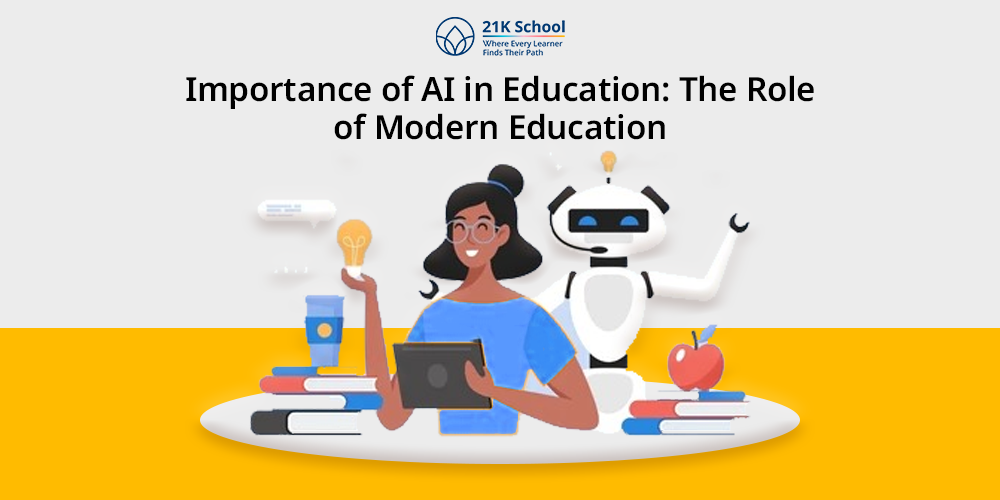
Think about walking into a classroom where lessons are designed as per your need or where the facilitators know everything that learners struggle with and how fast you learn.
Feeling something interesting or futuristic? Well, yes it’s Artificial Intelligence. A future in which learners have lots of advantages.
AI is rapidly becoming a game-changer in modern education, transforming the way of individual learning, how facilitators teach, and even how schools work effectively.
Are you someone looking for a fresh start for yourself or your kid? It’s time to get everything from smart tutoring systems to personalized learning apps.
AI in the 21st century is taking education in a more accessible, engaging, and effective manner. But is it beneficial for the future of learning?
Here we will understand how AI is crucial in education and why it is important for today’s schools and classrooms.
Contents
- 1 What is AI in Education?
- 2 15 Importance of AI in Education of Children in 21st Century
- 2.1 1. Personalized Learning
- 2.2 2. Task Automation
- 2.3 3. Intelligent Tutoring Systems
- 2.4 4. Easy Accessibility
- 2.5 5. Adaptive Assessments
- 2.6 6. Immediate Feedback
- 2.7 7. Predictive Analysis
- 2.8 8. Content Creation
- 2.9 9. Automated Grading
- 2.10 10. Student Engagement
- 2.11 11. Closing the Skill Gap
- 2.12 12. Engagement
- 2.13 13. Language Acquisition
- 2.14 14. Professional Development
- 2.15 15. Academic Integrity
- 3 Future of AI in Education
- 4 Conclusion
What is AI in Education?
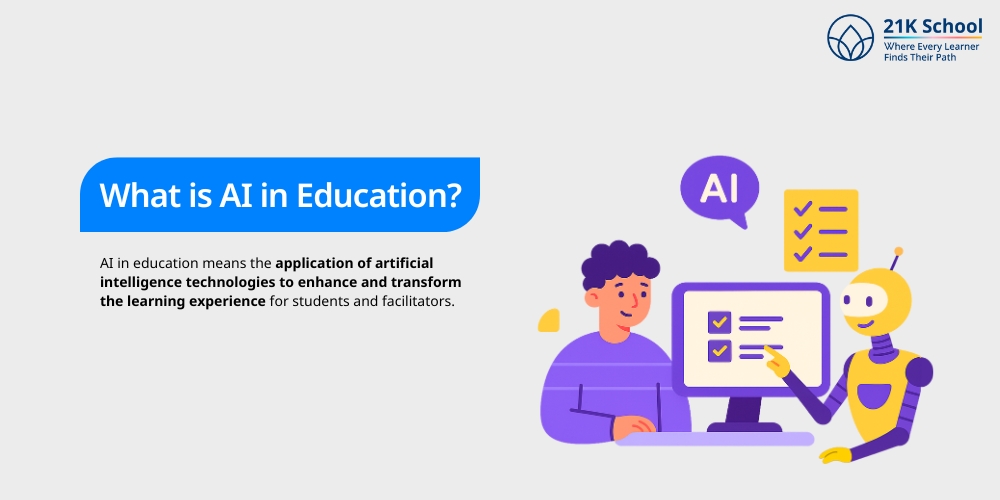
AI in education means the application of artificial intelligence technologies to enhance and transform the learning experience for students and facilitators.
With the help of AI one can ensure personalization of learning, automate administrative tasks, and provide more engaging and effective educational resources.
The AI technology is beneficial because of its customized, flexible, and adaptive learning paths.
15 Importance of AI in Education of Children in 21st Century
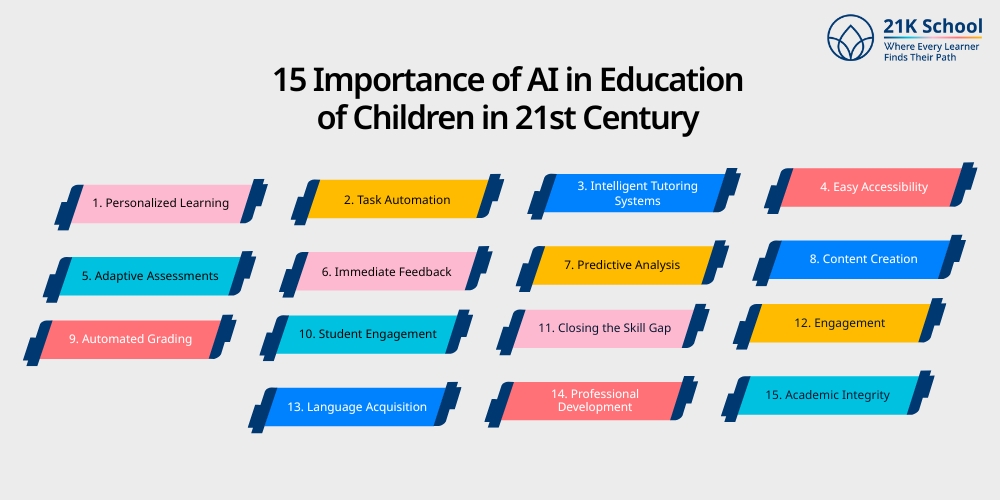
The importance of AI in education lies in its ability to personalize learning, automate administrative tasks and enhance accessibility.
It helps in optimizing learning results and fosters a more engaging and efficient educational experience for all. Here’s a brief elaboration:
1. Personalized Learning
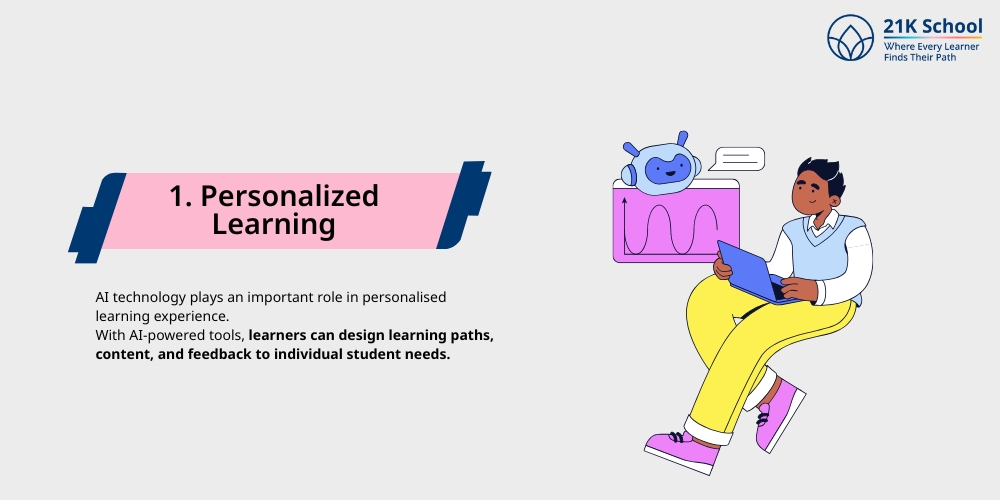
AI technology plays an important role in personalised learning experience.
With AI-powered tools, learners can design learning paths, content, and feedback to individual student needs.
It also improves student engagement , data analysis and academic outcomes. Personalized learning makes education more accessible for students with disabilities.
Read on to learn more about top benefits of personalized learning .
2. Task Automation

One of the importance of AI in education is task automation. It reduces the workload of facilitators by automating administrative and repetitive tasks.
They can free them to focus on learners’ interaction and personalized learning. AI can automate grading, attendance tracking, assessment creation, and feedback generation.
This helps facilitators to dedicate more time in educating and supporting learners when needed. It also extends to administrative tasks for example, scheduling and managing student records.
3. Intelligent Tutoring Systems
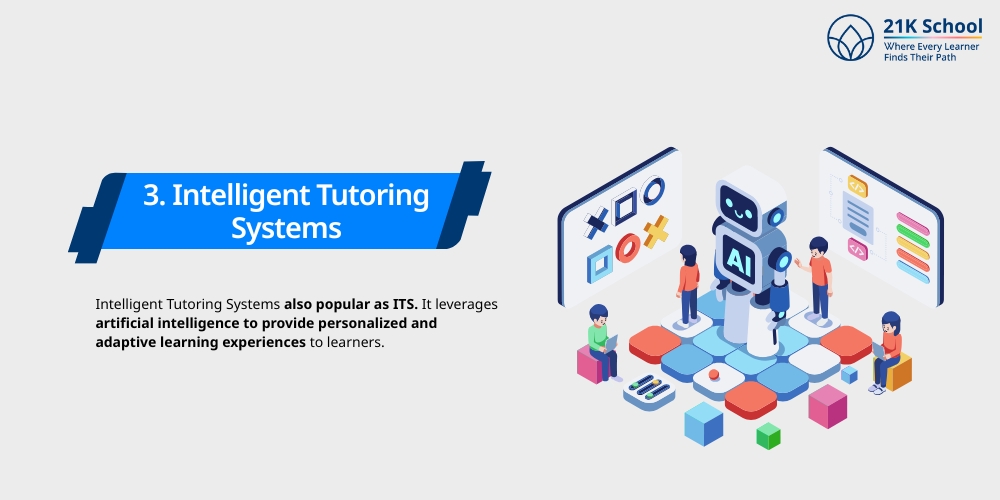
Intelligent Tutoring Systems also popular as ITS. It leverages artificial intelligence to provide personalized and adaptive learning experiences to learners.
The system provides instruction, immediate feedback, and customized learning paths, mimicking one-on-one tutoring and addressing individual learners requirements.
4. Easy Accessibility
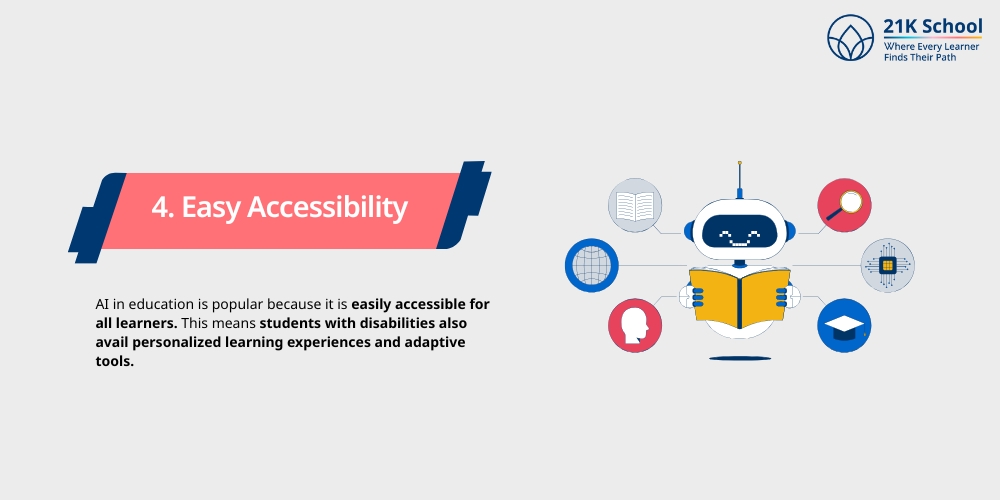
AI in education is popular because it is easily accessible for all learners. This means students with disabilities also avail personalized learning experiences and adaptive tools.
Discover everything about AI in special education .
AI-powered systems can design learning material based on individual needs. It also offers real-time feedback and automates administrative tasks, freeing up educators to focus on student engagement.
Learners can now get inclusive and effective learning environments where they can gain knowledge as per their own pace and receive the guidance they need.
5. Adaptive Assessments
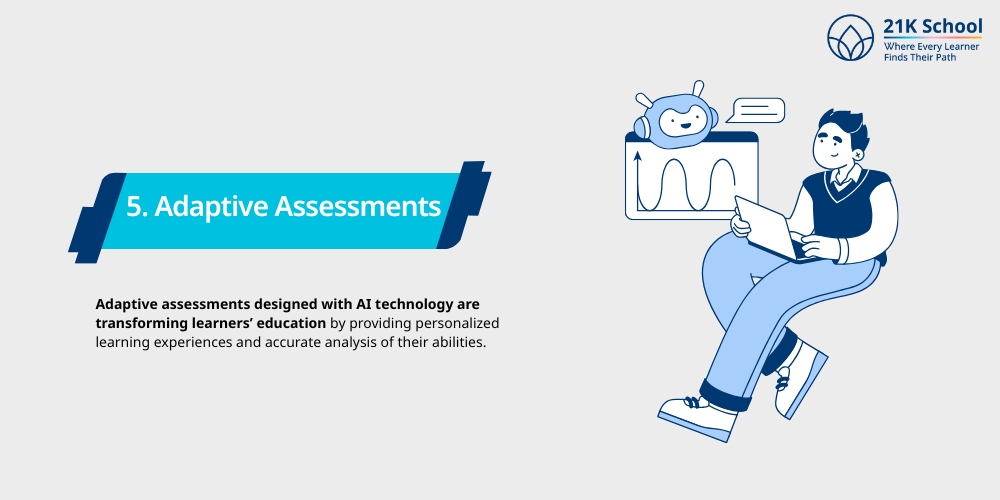
Adaptive assessments designed with AI technology are transforming learners’ education by providing personalized learning experiences and accurate analysis of their abilities.
These assessments adapt in real-time to each learner’s performance. It provides customized learning paths and targeted feedback.
This results in more efficient and effective learning, increased engagement and enhanced educational outcomes.
6. Immediate Feedback
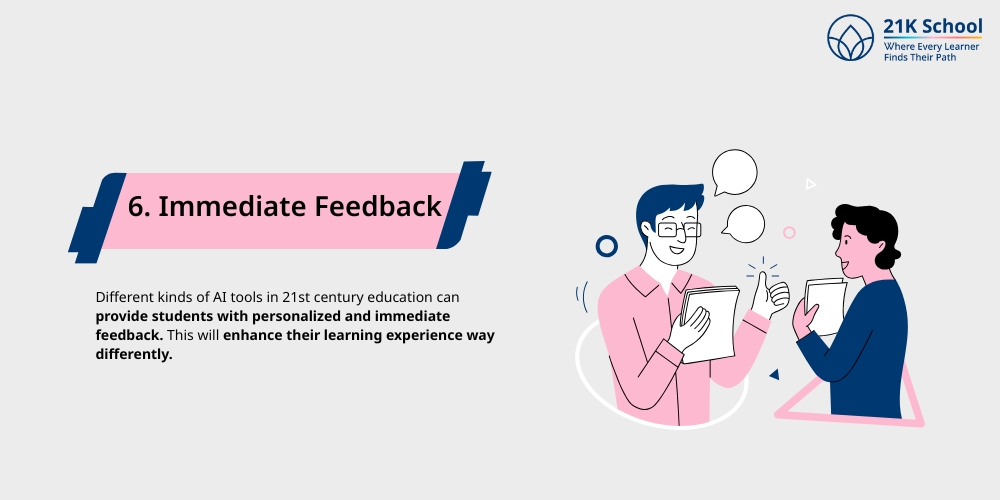
Different kinds of AI tools in 21st century education can provide students with personalized and immediate feedback.
This will enhance their learning experience way differently. The instant feedback guides learners to rapidly understand their mistakes, reinforce right answers and adjust their learning strategies in real-time.
Variety apps such as Khan Academy and Edmodo offer instant feedback loops. This will help learners know mistakes and resolve them quickly.
7. Predictive Analysis

With AI in education predictive analysis becomes easy for facilitators. It is important to improve learners’ results.
It can identify potential learning gaps , personalizing learning experiences, and optimizing resource allocation. Now, educators can proactively support learners.
To intervene early during challenging situations and construct solutions based on individual needs. This ultimately enhances their success and engagement.
8. Content Creation
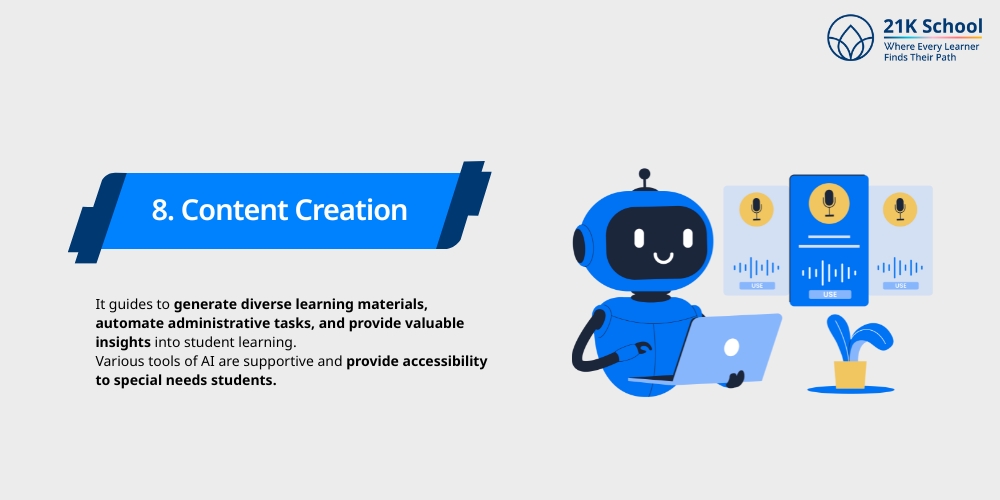
AI in education is important to transform content creation by making it more personalized, engaging, and efficient.
It guides to generate diverse learning materials, automate administrative tasks, and provide valuable insights into student learning.
Various tools of AI are supportive and provide accessibility to special needs students. This will foster a more inclusive learning environment.
9. Automated Grading
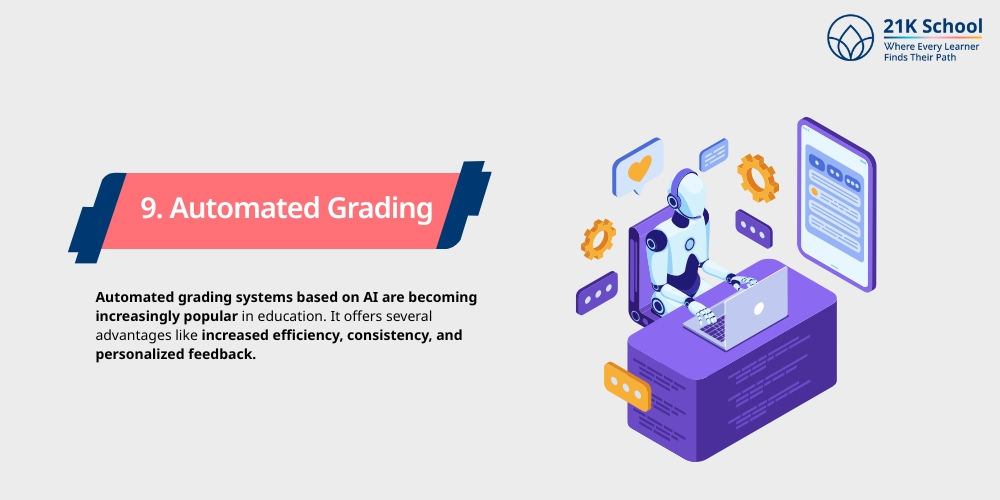
Automated grading systems based on AI are becoming increasingly popular in education. It offers several advantages like increased efficiency, consistency, and personalized feedback.
As the name mentioned, the system automatically evaluates the assignments, freeing up learners time to focus on other essential aspects of teaching and interacting with students.
AI grading in modern education ensures fairness and reduces bias which leads to more objective evaluations.
10. Student Engagement
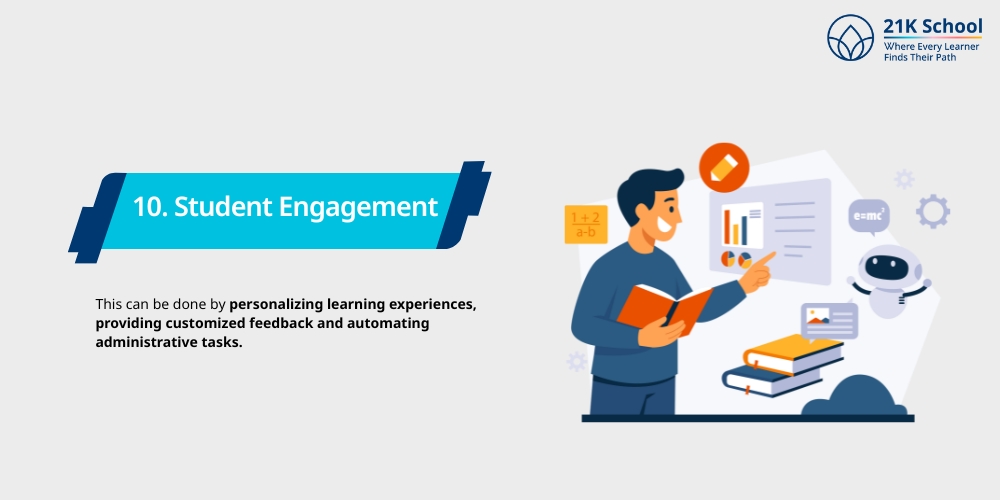
AI plays a crucial role in enhancing student engagement in education. This can be done by personalizing learning experiences, providing customized feedback and automating administrative tasks.
Tools related to AI can analyze individual learning patterns and adjust learning paths accordingly. It makes education more interactive and engaging for learners.
11. Closing the Skill Gap
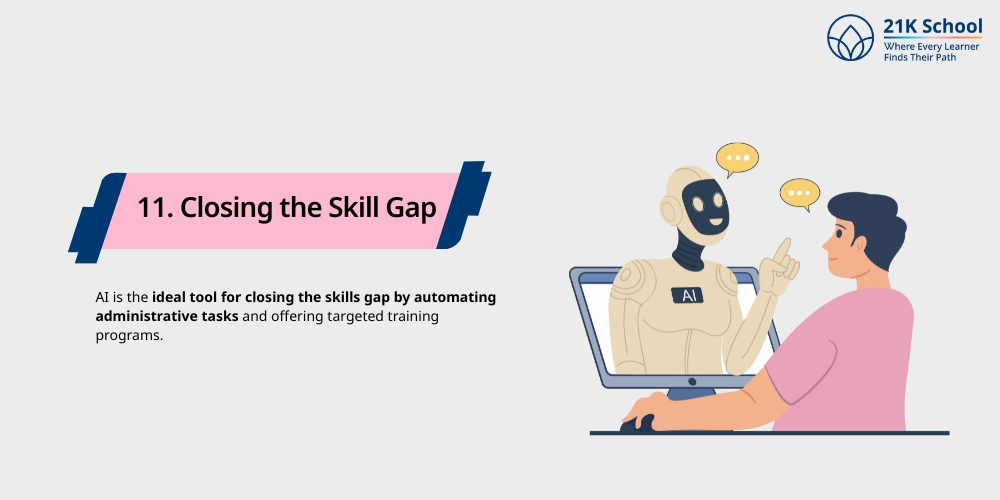
AI is the ideal tool for closing the skills gap by automating administrative tasks and offering targeted training programs.
By this way students and professionals meet the demands of an AI-driven workforce. This means AI can suggest courses and skills students need to succeed in the future.
Platforms like LinkedIn learning and Coursera use AI to recommend relevant career-oriented content. This ensures learners are better prepared for the evolving job landscape.
Read a brief explanation about How Teachers are Using AI in Education ?
12. Engagement

AI is nowadays important for engagement in education. AI tools can construct educational content for individual student needs. This makes learning more relevant and motivating.
Various gamified learning platforms and virtual assistants create engaging and interactive learning environments, improving learners interest and motivation.
It is also capable of automating administrative tasks, freeing up educators to focus on student support and fostering a more engaging learning environment.
13. Language Acquisition
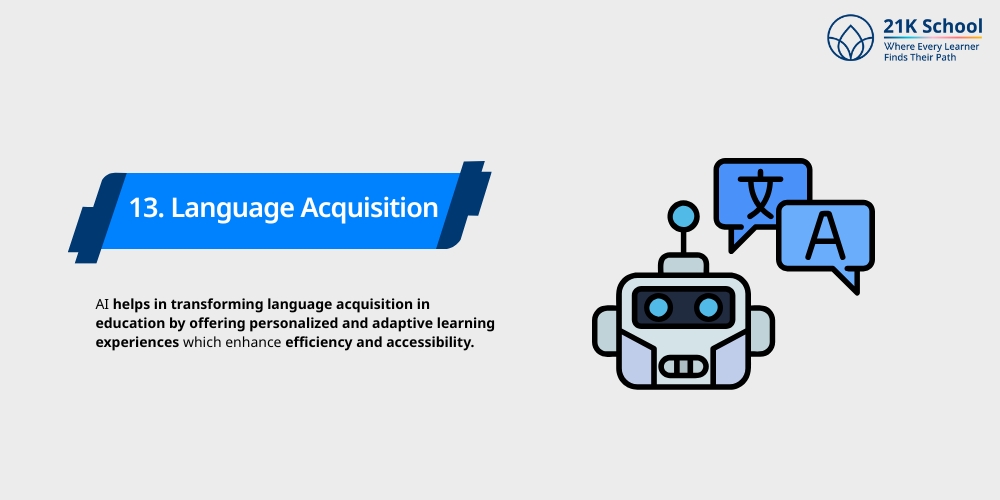
AI helps in transforming language acquisition in education by offering personalized and adaptive learning experiences which enhance efficiency and accessibility.
Various language learning platforms effectively analyze each learner’s strengths and weaknesses. It also creates content and exercises to specific needs.
This consists of features such as personalized feedback, customized learning paths, and even AI-driven chatbots that simulate real-life conversations. It fosters both confidence and practical language skills.
14. Professional Development
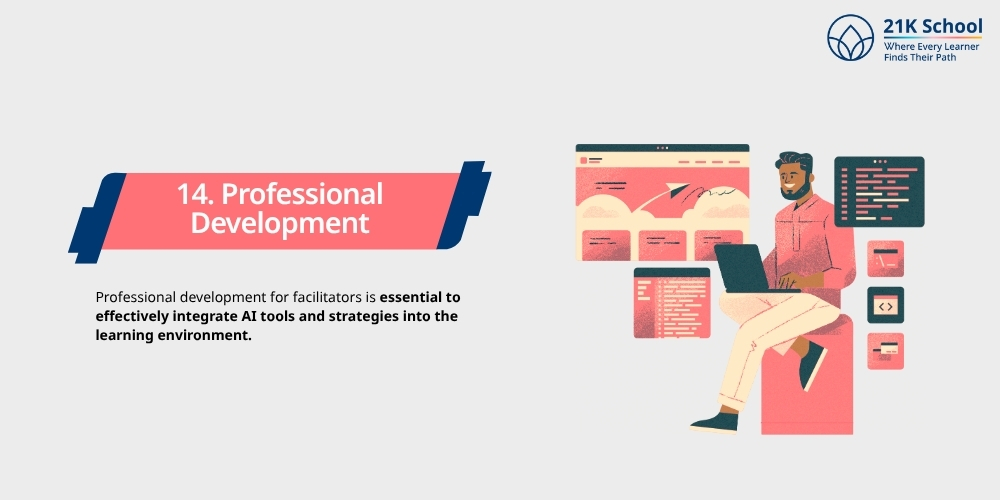
Professional development for facilitators is essential to effectively integrate AI tools and strategies into the learning environment. It ensures that AI complements and enhances, rather than replaces, human interaction in education.
These tools assess a facilitator’s performance through proper analytics of the classroom and offer the best feedback. This leads to future growth and mastery in their profession.
15. Academic Integrity
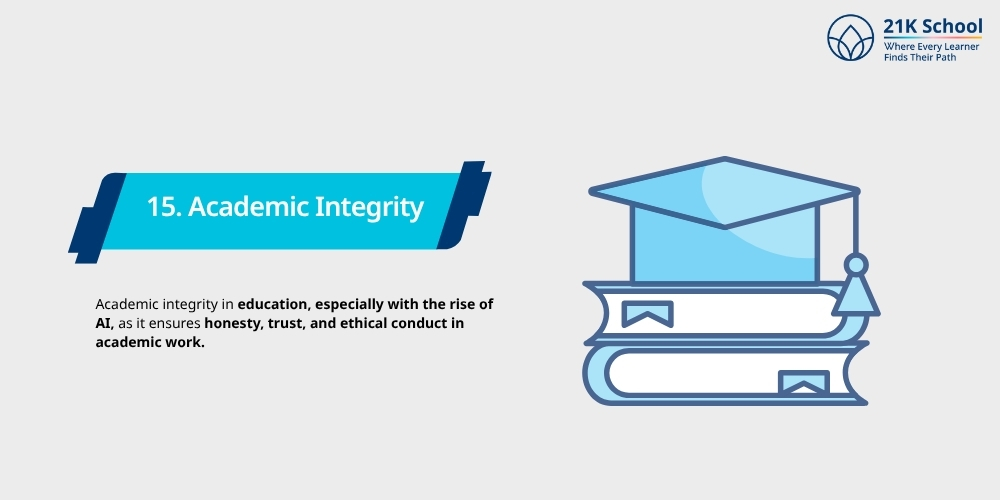
Academic integrity in education, especially with the rise of AI, as it ensures honesty, trust, and ethical conduct in academic work.
AI helps uphold academic honesty by detecting plagiarism and cheating. Advanced plagiarism detectors compare learners’ assignments against vast databases to identify copied content.
It helps in maintaining academic integrity, for example, some AI tools monitor learners during exams using facial recognition, eye tracking, and behavior analysis to detect suspicious activities.
Future of AI in Education
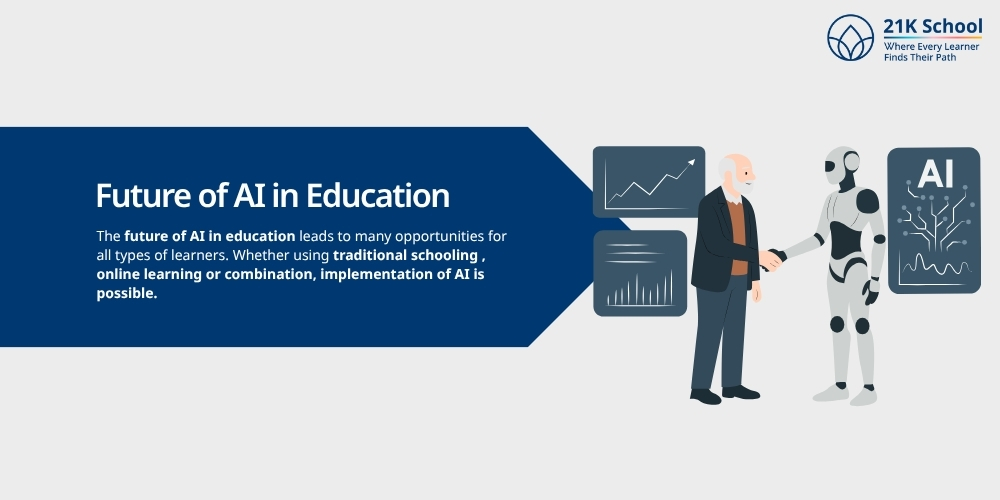
The future of AI in education leads to many opportunities for all types of learners. Whether using traditional schooling , online learning or combination, implementation of AI is possible.
Get a desired environment with potential to personalize learning, automate administrative tasks and enhance teaching methods.
Support Lifelong Learning
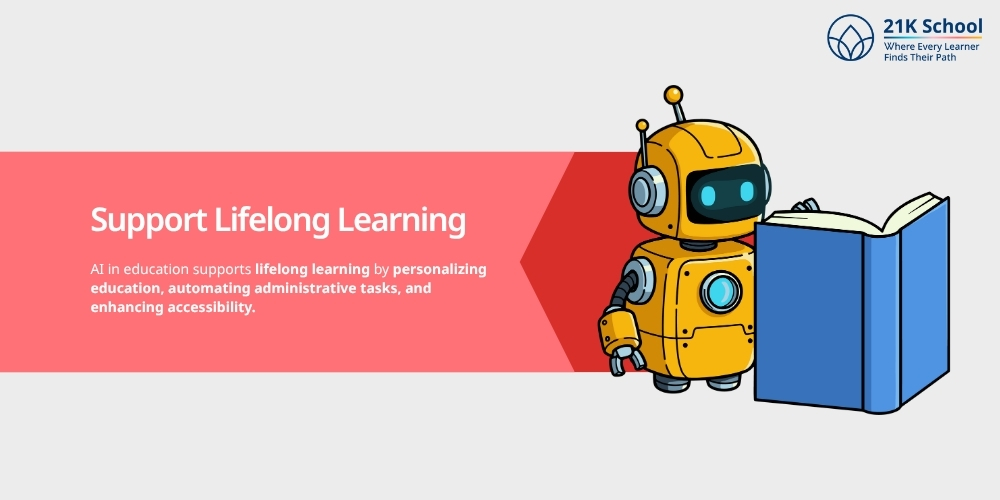
AI in education supports lifelong learning by personalizing education, automating administrative tasks, and enhancing accessibility.
AI-driven lifelong learning aims to create more engaging, efficient, and inclusive educational landscapes for all learners.
Immersive Learning Experiences
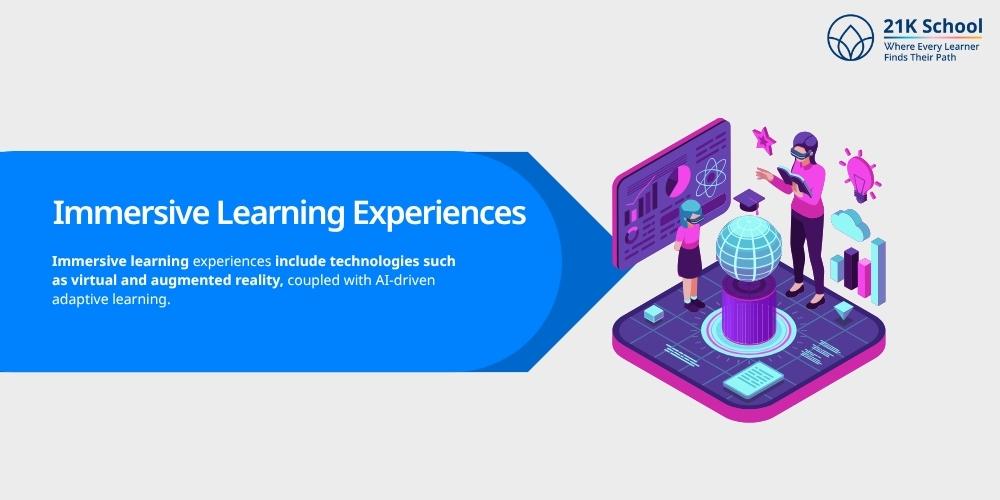
Immersive learning experiences include technologies such as virtual and augmented reality, coupled with AI-driven adaptive learning.
Now, learners can engage with educational material in dynamic, interactive, and customized ways that were unimaginable traditionally.
Global Classrooms
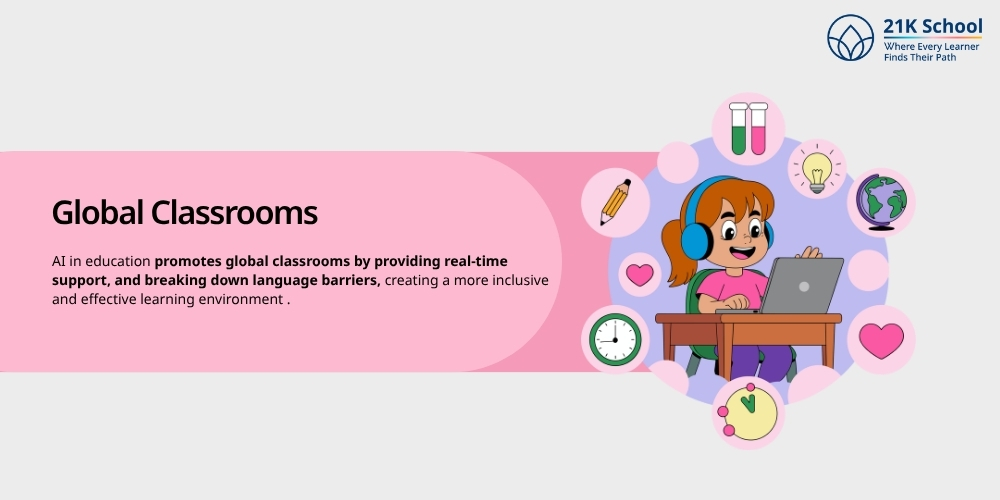
AI in education promotes global classrooms by providing real-time support, and breaking down language barriers, creating a more inclusive and effective learning environment .
Data-informed Policy Making

Data-informed policy-making is important for integrating AI in education effectively. It can be maintained by them to strategies the future needs.
It will maximize AI’s benefits in education. By establishing ethical guidelines, ensuring equitable access to AI tools, and fostering collaboration between facilitators, tech developers, and researchers it is possible.
Enhanced Teaching Methods
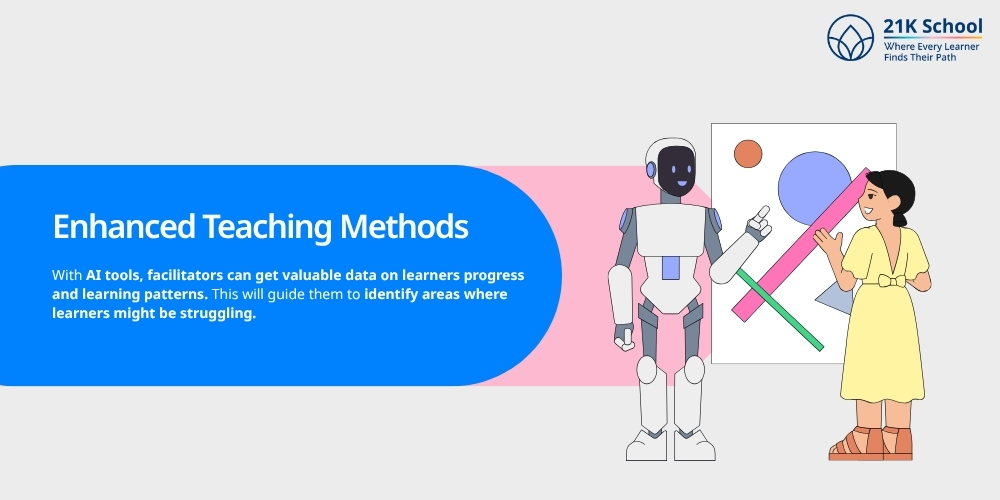
With AI tools, facilitators can get valuable data on learners progress and learning patterns. This will guide them to identify areas where learners might be struggling.
They can analyze the data, make strategies and use the approach to provide effective learning solutions.
Conclusion
AI in 21st century education is crucial and the right pathways to success. It holds the strength to make education more inclusive, efficient and future-ready.
However, what truly harnesses AI’s potential, facilitators, administrators and technologists need to work together to create frameworks. It prioritises ethical use, data privacy, and equitable access.
Whether AI will replace teachers in the 21st century education system or not.
In the fast moving world of education, AI is just a helpful tool for students, parents and facilitators. Implementation of AI should be wise and accurate for better results.
It’s time to transform 21st century education with an AI driven environment. The question is no longer whether AI should be used in education or not. One should know how to best leverage its power to increase human potential at scale.
